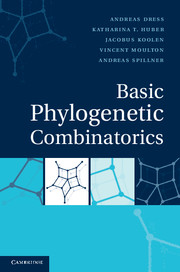Book contents
- Frontmatter
- Contents
- Preface
- 1 Preliminaries
- 2 Encoding X-trees
- 3 Consistency of X-tree encodings
- 4 From split systems to networks
- 5 From metrics to networks: The tight span
- 6 From quartet and tree systems to trees
- 7 From metrics to split systems and back
- 8 Maps to and from quartet systems
- 9 Rooted trees and the Farris transform
- 10 On measuring and removing inconsistencies
- Commonly used symbols
- Bibliography
- Index
Preface
Published online by Cambridge University Press: 05 June 2012
- Frontmatter
- Contents
- Preface
- 1 Preliminaries
- 2 Encoding X-trees
- 3 Consistency of X-tree encodings
- 4 From split systems to networks
- 5 From metrics to networks: The tight span
- 6 From quartet and tree systems to trees
- 7 From metrics to split systems and back
- 8 Maps to and from quartet systems
- 9 Rooted trees and the Farris transform
- 10 On measuring and removing inconsistencies
- Commonly used symbols
- Bibliography
- Index
Summary
More than one and a half centuries have passed since Charles Darwin presented his theory on the origin of species asserting that all organisms are related to each other by common descent via a “tree of life”. Since then, biologists have been able to piece together a great deal of information concerning this tree — relying in particular in more recent times on the advent of ever cheaper and faster DNA sequencing technologies. Even so, there remain many fascinating open problems concerning the tree of life and the evolutionary processes underlying it, problems that often require sophisticated techniques from areas such as mathematics, computer science, and statistics.
Phylogenetic combinatorics can be regarded as a branch of discrete applied mathematics concerned with the combinatorial description and analysis of phylogenetic or evolutionary trees and related mathematical structures such as phylogenetic networks, complexes, and tight spans. In this book, we present a systematic approach to phylogenetic combinatorics based on a natural conceptual framework that, simultaneously, allows and forces us to encompass many classical as well as a good number of new pertinent results.
More specifically, this book concentrates on the interrelationship between the three principal ways commonly used for encoding phylogenetic trees: Split systems, metrics, and quartet systems (see Figure 1). Informally, for X some finite set, a split system over X is a collection of bipartitions of X, a quartet system is a collection of two-versus-two bipartitions of subsets of X of size four, and a metric is a bivariate function assigning a “distance” to any pair of elements in X.
- Type
- Chapter
- Information
- Basic Phylogenetic Combinatorics , pp. ix - xiiPublisher: Cambridge University PressPrint publication year: 2011



